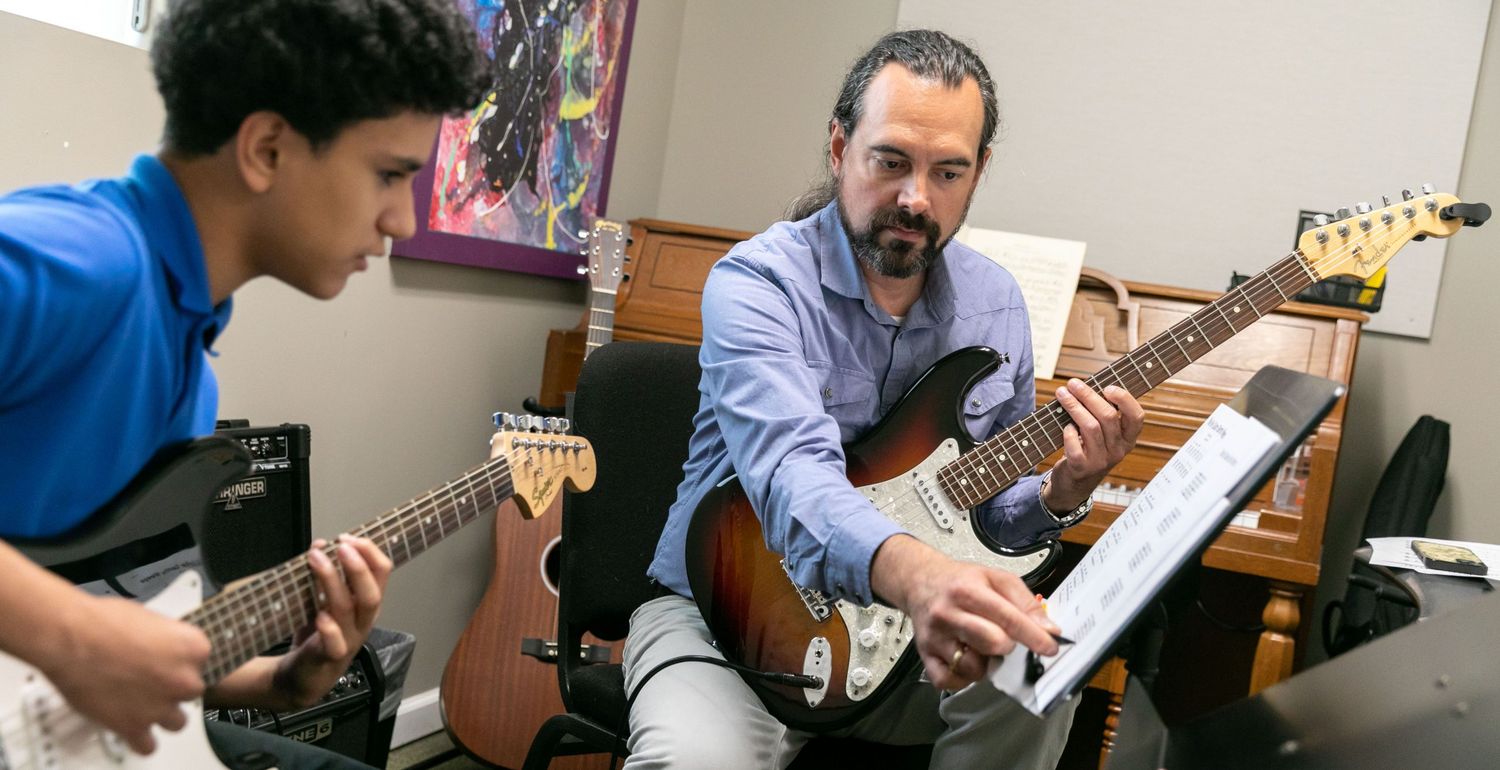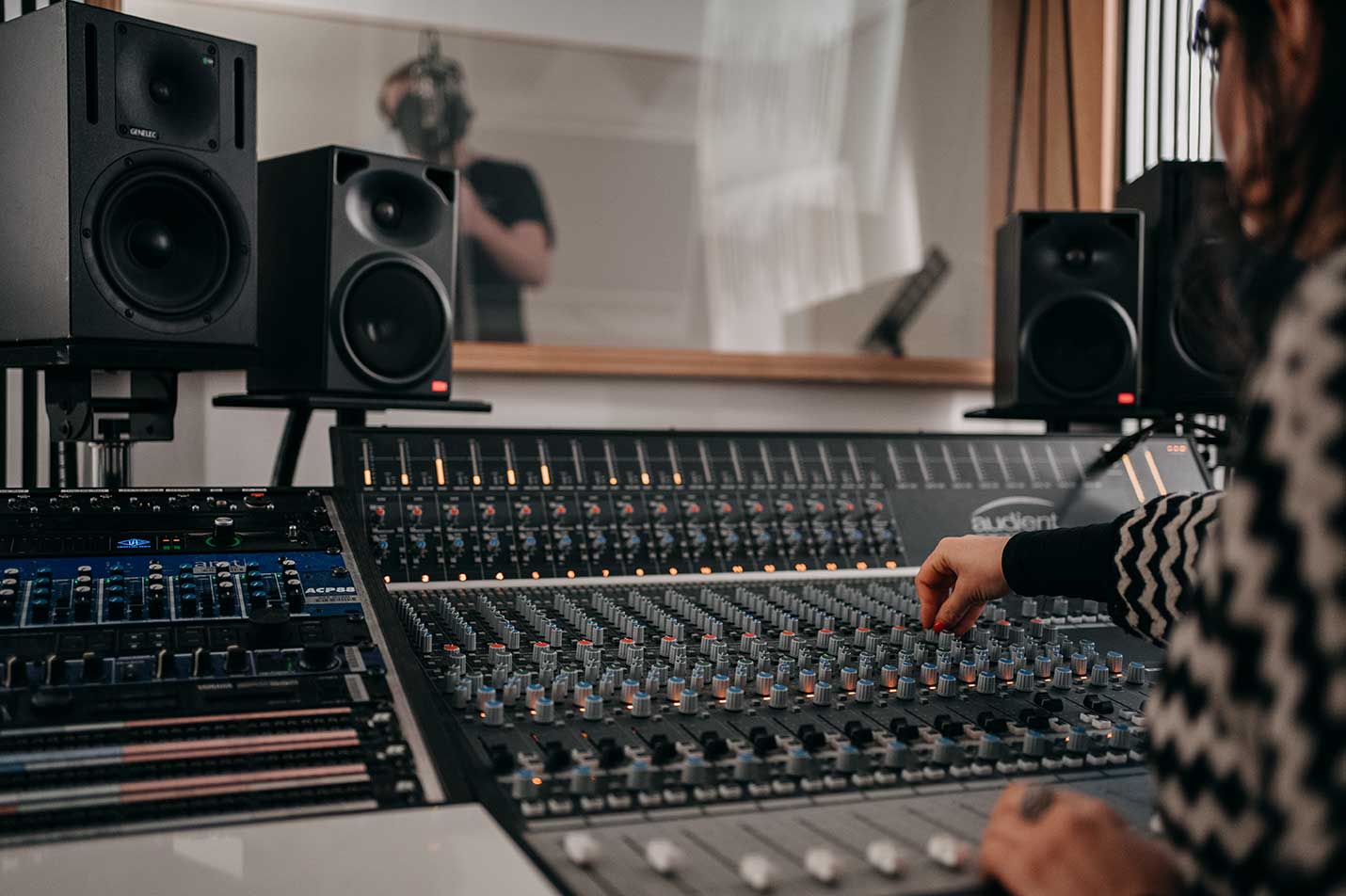Home>Instruments>Guitar>How To Become A Guitar Teacher


Guitar
How To Become A Guitar Teacher
Published: February 12, 2024
Learn how to become a successful guitar teacher with our comprehensive guide. Gain the skills and knowledge needed to excel in teaching guitar. Start your journey today!
(Many of the links in this article redirect to a specific reviewed product. Your purchase of these products through affiliate links helps to generate commission for AudioLover.com, at no extra cost. Learn more)
Table of Contents
Introduction
So, you're a passionate guitarist with a wealth of knowledge and skills, and you're considering sharing your expertise by becoming a guitar teacher. Congratulations on taking this exciting step toward inspiring and educating aspiring musicians! As you embark on this journey, it's essential to recognize that teaching guitar goes beyond simply demonstrating chords and scales. It involves a deep understanding of music theory, effective communication, and the ability to tailor lessons to individual students' needs.
Becoming a successful guitar teacher requires a combination of musical proficiency, pedagogical skills, and a genuine passion for guiding others on their musical path. This comprehensive guide will walk you through the essential steps to help you establish yourself as a reputable and sought-after guitar instructor. Whether you're a seasoned performer or a dedicated student with a desire to teach, this roadmap will provide valuable insights to set you on the right track.
Throughout this guide, we'll explore the crucial elements of mastering your instrument, understanding music theory, honing your teaching abilities, crafting engaging lesson plans, gaining hands-on experience, and effectively promoting your services. By following these steps and integrating your unique musical style and personality into your teaching approach, you'll be well-equipped to embark on a fulfilling and successful career as a guitar teacher.
So, let's dive in and explore the key components that will empower you to become a confident, skilled, and inspiring guitar instructor. Whether you dream of teaching in a renowned music school, offering private lessons, or conducting online tutorials, this guide will equip you with the knowledge and strategies to thrive in the dynamic and rewarding world of guitar education.
Step 1: Master Your Instrument
Before you can effectively teach others, it’s crucial to attain a high level of proficiency on the guitar. This involves not only mastering various playing techniques and styles but also developing a deep understanding of the instrument’s mechanics and nuances. Dedicate ample time to practice and refine your skills, exploring diverse genres and playing techniques to broaden your musical repertoire. Whether you’re drawn to the soul-stirring melodies of classical guitar or the electrifying riffs of rock and blues, immersing yourself in different styles will enrich your musical prowess and prepare you to cater to a wide range of student preferences.
Continual learning and improvement are integral to mastering the guitar. Embrace opportunities to expand your knowledge through online tutorials, instructional books, and, if possible, formal education in music. Additionally, studying the works of renowned guitarists and dissecting their playing techniques can offer valuable insights that you can impart to your future students.
Furthermore, honing your improvisation skills and understanding the intricacies of music composition will enhance your ability to convey musical concepts effectively. As you progress on your musical journey, strive to foster a deep connection with your instrument, allowing your passion for playing to shine through in every note you produce.
Ultimately, mastering your instrument goes beyond technical proficiency; it involves cultivating a profound love and respect for the art of guitar playing. By immersing yourself in the instrument’s rich history and embracing its limitless potential for creativity, you’ll not only elevate your own playing but also inspire and captivate those you teach.
Step 2: Study Music Theory
While virtuoso guitar skills are undeniably impressive, a solid foundation in music theory is equally essential for any aspiring guitar teacher. Understanding the fundamental principles of music theory equips you with the knowledge to explain the intricacies of harmony, melody, rhythm, and chord progressions to your students. This knowledge forms the backbone of your ability to communicate effectively and guide aspiring musicians on their musical journey.
Begin by familiarizing yourself with basic concepts such as scales, intervals, and chord construction. As you delve deeper, explore advanced topics including modal theory, harmonic analysis, and counterpoint. Enrolling in a music theory course at a local college or pursuing online resources can provide structured learning and valuable guidance as you navigate the intricacies of musical notation and composition.
Moreover, understanding how music theory intersects with the unique characteristics of the guitar is crucial. Delve into the specifics of guitar-centric theory, such as chord voicings, fretboard navigation, and scale patterns. This specialized knowledge will enable you to tailor your teaching approach to the idiosyncrasies of the instrument, empowering your students to grasp complex concepts with clarity and confidence.
As you immerse yourself in the realm of music theory, seek opportunities to apply your newfound knowledge in practical settings. Analyze diverse musical pieces, deconstructing their theoretical underpinnings to gain a deeper appreciation for the art of composition. Additionally, consider composing your own music or arranging existing pieces, allowing theory to inform and enrich your creative endeavors.
By mastering music theory, you’ll not only enhance your own musicianship but also lay a robust groundwork for effectively conveying the intricacies of music to your future students. This comprehensive understanding will enable you to instill a profound appreciation for the theoretical aspects of music in those you teach, nurturing well-rounded and informed musicians who can confidently navigate the captivating world of guitar playing.
Step 3: Develop Teaching Skills
Transitioning from a proficient guitarist to an effective guitar teacher requires the cultivation of pedagogical skills that foster a supportive and enriching learning environment. Central to this is the ability to communicate complex musical concepts in a clear, accessible manner that resonates with students of varying skill levels. To develop these essential teaching skills, consider enrolling in courses focused on music education or pedagogy, which can provide valuable insights into instructional techniques and strategies.
Furthermore, seek opportunities to observe experienced music educators in action, whether through volunteering at local music schools or attending workshops and seminars. By witnessing seasoned teachers navigate diverse learning styles and address common challenges, you can glean valuable wisdom that will inform your own teaching approach.
Effective communication lies at the heart of teaching, and as such, honing your ability to articulate musical concepts with patience and clarity is paramount. Embrace the role of a mentor, guiding students through challenges with empathy and encouragement, fostering an environment where mistakes are viewed as valuable learning opportunities.
Additionally, cultivating the skill of active listening is pivotal in understanding each student’s unique learning style and tailoring your approach to suit their individual needs. By recognizing and adapting to the diverse ways in which students absorb and process information, you can create a personalized and impactful learning experience for each individual under your guidance.
Embrace innovative teaching methods, incorporating technology and multimedia resources to engage and inspire your students. Utilize interactive apps, online tutorials, and visual aids to supplement traditional teaching approaches, fostering a dynamic and immersive learning environment.
By continuously refining your teaching skills, you’ll be well-equipped to inspire and empower your students, nurturing their musical growth and instilling in them a deep passion for the art of guitar playing.
Step 4: Create Lesson Plans
Developing well-structured and engaging lesson plans is a cornerstone of effective guitar instruction. Each lesson plan serves as a roadmap for your students’ musical development, guiding them through a comprehensive and organized learning experience. Begin by outlining clear learning objectives for each lesson, ensuring that they align with the overarching goals of your curriculum.
When crafting lesson plans, consider the diverse needs and aspirations of your students. Tailor your approach to accommodate varying skill levels, musical interests, and learning paces. Whether you’re teaching beginners the fundamentals of chord progressions or guiding advanced students through intricate soloing techniques, it’s crucial to strike a balance between challenging and achievable learning tasks.
Introduce a variety of teaching materials and resources into your lesson plans, including sheet music, tablature, instructional books, and audiovisual aids. By offering a multifaceted learning experience, you can cater to different learning styles and enrich your students’ musical journey.
Moreover, integrate practical and theoretical components into your lesson plans to provide a holistic learning experience. Balancing technical exercises with theoretical discussions ensures that students not only refine their playing skills but also deepen their understanding of musical concepts.
Encourage student engagement and creativity by incorporating opportunities for improvisation, composition, and collaborative music-making in your lesson plans. Fostering a supportive environment where students can explore their musical inclinations will fuel their passion for learning and inspire their artistic growth.
Regularly review and adapt your lesson plans based on student progress and feedback, remaining flexible and responsive to their evolving needs. Embrace a dynamic and adaptive approach to teaching, allowing your lesson plans to evolve alongside the musical development of your students.
By meticulously crafting comprehensive and dynamic lesson plans, you’ll play a pivotal role in nurturing your students’ musical abilities, instilling in them a deep appreciation for the art of guitar playing, and fostering a lifelong love for creating music.
Step 5: Gain Experience
Embarking on the journey to become a proficient guitar teacher involves acquiring practical experience in educational settings. Seek opportunities to apply your teaching skills and musical expertise by offering private lessons, volunteering at local music schools, or conducting workshops. This hands-on experience will not only refine your instructional abilities but also provide valuable insights into the diverse learning needs and preferences of students.
Consider pursuing internships or assistant teaching positions under experienced guitar instructors to gain firsthand exposure to the dynamics of music education. Observing seasoned educators in action and actively participating in the teaching process will offer invaluable mentorship and guidance as you navigate the nuances of guitar instruction.
Furthermore, explore opportunities to lead group classes or ensemble rehearsals, honing your ability to manage and inspire collective musical endeavors. Facilitating collaborative music-making experiences will equip you with the skills to foster a cohesive and supportive musical community among your students.
As you accumulate teaching experience, actively seek feedback from students, colleagues, and mentors to continually refine and enhance your instructional approach. Embrace constructive criticism as a catalyst for growth, leveraging insights from your teaching experiences to adapt and evolve as an educator.
Additionally, consider pursuing professional development opportunities such as attending music education conferences, enrolling in specialized teaching workshops, or obtaining certifications in music pedagogy. These endeavors will not only expand your knowledge base but also demonstrate your commitment to continuous improvement as a guitar teacher.
By actively seeking and embracing diverse teaching experiences, you’ll cultivate a versatile and adaptable approach to guitar instruction, preparing you to effectively engage and inspire students from all walks of life and musical backgrounds.
Step 6: Network and Promote Yourself
Establishing a strong professional network and effectively promoting your services are pivotal steps in launching a successful career as a guitar teacher. Begin by connecting with fellow musicians, music educators, and local music communities to expand your professional circle. Attending open mic nights, music festivals, and industry events provides valuable opportunities to forge meaningful connections and showcase your musical prowess.
Utilize digital platforms to create a compelling online presence, including a professional website and active social media profiles. Showcase your expertise through engaging content such as instructional videos, musical performances, and insightful blog posts. Leveraging these platforms to share your musical journey and instructional insights will not only amplify your visibility but also position you as a knowledgeable and approachable guitar instructor.
Collaborate with local music schools, instrument retailers, and community centers to explore potential partnerships and teaching opportunities. Establishing affiliations with established music institutions can enhance your credibility as a guitar teacher and provide access to a broader student base.
Embrace the power of word-of-mouth marketing by encouraging satisfied students to refer their peers to your teaching services. Building a reputation for fostering a positive and enriching learning experience will organically attract new students and solidify your standing within the local music community.
Consider offering introductory workshops, free trial lessons, or promotional discounts to entice prospective students and showcase your teaching style. These initiatives not only serve as effective promotional tools but also provide a glimpse into the exceptional learning experience you offer.
Continuously seek opportunities to showcase your musical talents and instructional prowess through live performances, community events, and educational workshops. By positioning yourself as an active and engaged member of the musical community, you’ll cultivate a strong and enduring presence as a reputable guitar teacher.
By actively networking and strategically promoting your teaching services, you’ll carve a distinct and compelling niche in the realm of guitar education, establishing yourself as a sought-after instructor with a genuine passion for nurturing musical talent.
Conclusion
Congratulations on embarking on the enriching journey of becoming a guitar teacher! Throughout this comprehensive guide, we’ve explored the essential steps to equip you with the knowledge, skills, and strategies needed to thrive in the dynamic realm of guitar education. From mastering your instrument and delving into music theory to honing your teaching skills, crafting engaging lesson plans, gaining practical experience, and promoting your services, you’ve gained valuable insights into the multifaceted world of guitar instruction.
As you venture into the realm of guitar education, remember that your journey as a teacher is a continual evolution. Embrace each opportunity to inspire and guide aspiring musicians, and remain open to refining your instructional approach based on the diverse needs and aspirations of your students.
By infusing your teaching with passion, creativity, and a genuine commitment to nurturing musical talent, you’ll not only impart technical proficiency but also instill a deep appreciation for the art of guitar playing in those you teach. Your role as a guitar teacher extends beyond imparting musical knowledge; it encompasses empowering individuals to express themselves through music, fostering a lifelong love for learning, and cultivating a vibrant and supportive musical community.
As you embark on this fulfilling path, remember that your unique musical journey and individual teaching style will enrich the lives of your students and contribute to the vibrant tapestry of guitar education. Whether you aspire to teach in prestigious music institutions, offer private lessons, or engage with students through digital platforms, your dedication to the art of guitar instruction will undoubtedly leave an indelible mark on the musical landscape.
Embrace the joys and challenges of guiding others on their musical odyssey, and revel in the transformative power of music as you embark on this rewarding career as a guitar teacher. Your passion, expertise, and unwavering commitment to nurturing musical talent will undoubtedly inspire countless aspiring musicians and contribute to the enduring legacy of guitar education.











